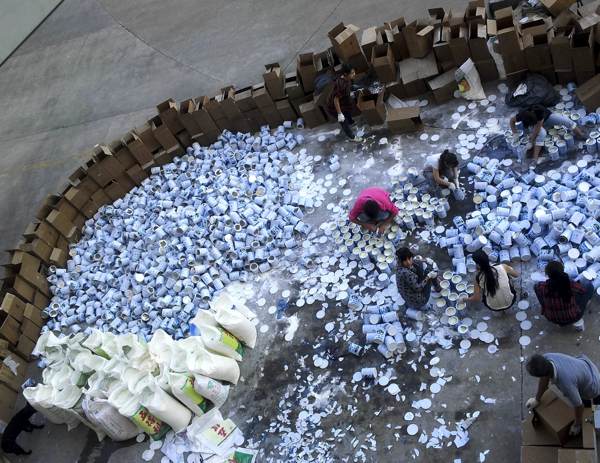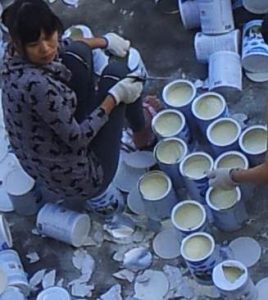In China, a conscious effort is made to avoid wasting anything. For example, they will try to eat all organs of an animal.
This good habit naturally made its way in the manufacturing industry:
- There are some defects? Let’s just mix them with the good products, to avoid being caught.
- The entire batch is rejected by a customer? Let’s try to sell it to another one, or to local shops.
In other words, don’t expect your Chinese suppliers to destroy a production that you have refused. They will never accept to take that kind of loss. They will try to do something else with it.
The designs were licensed and bear your brand name? So what?
The products are actually unsafe and should not be used by anybody? Who are you to judge that?
On Saturday I found a good example. Something weird was going on, in the fisherman’s wharf of Shekou:
Here is what I saw:
- The cans contained powder milk.
- Every single can’s lid had already been punched before getting to this place.
- The workers opened the lid fully, and others emptied the cans inside large bags.
These cans had clearly been rejected. That port is very close to Hong Kong, so one can imagine many scenarios.
What will they do with all this milk powder? I hope they feed pigs with it, but I am afraid they re-package it in a dirty factory and re-sell it in stores…
Milk powder has been suspect in the eyes of most Chinese since the Sanlu scandal of 2008. Tons of milk are purchased in Hong Kong and brought to the mainland every month.
Old habits die hard…
——————————-
A few words from our friends at Global Sources:
November issue of Global Sources sourcing e-Magazines out now! Subscribe FREE for verified supplier contact details, latest products & exclusive industry trends! (Available in 18 titles)




Very interesing post~ ” Re-sell ” Or ” Re-use” is very common in china. If clients rejected the goods then fty is total lose in order, so they will try all the methods to sell this ”rejected goods” to other shops/other clients, at least they can get back the production cost of this order. Another point is , if rejected goods stay in fty warehouse, it will occupy too much space (involve storage cost then ) … And, I think all the boss is very very unhappy to see the rejected goods stay in fty ( all are his money !!)
Thanks. Yes, a Chinese manufacturer generally won’t accept to “just eat the loss on this order and move on”. You are right.
Well, what can I say… as an exclusive agent for a very high quality infants milk powder factory from Australia, it just makes my job easier. Chinese are already so very wary of poor quality. So when dealing with an Australian selling Australian milk products, quality is never an issue. if people want a reliable source of Milk powder from Australia, I am happy to pass on details. Contact me: jamesrein@gmail.com